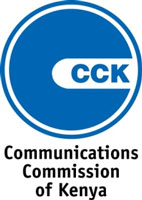CCK's responds to issue of broadcasting frequencies

The CCK wishes to respond to the agitation as follows:
- The spectrum in question
The spectrum/frequencies in question here (i.e. 700MHz band) will only become available for re-assignment for use in deployment of non-broadcasting services after the successful migration from analogue to digital TV broadcasting. According to an international agreement reached at the International Telecommunication Union (ITU) in 2006, member countries party to the agreement (including states in Africa, Europe, Russia and the Middle East) set 17th June 2015 as the global deadline for the switch-off of analogue TV broadcasting. The ITU is a specialized UN agency in the field of ICTs to which Kenya is affiliated. As a member of the ITU, Kenya is bound by the provisions of this agreement.
- Transition to digital TV broadcasting
To prepare the country for smooth and timely transition to digital TV broadcasting, the Government of Kenya constituted the Digital Television Committee (DTC) to oversee the migration process. The DTC recommended an early transition deadline of 2012 to enable the country to have the flexibility and time to address any difficulties that may arise before the multi-laterally agreed deadline of 2015. The demand for broadcasters to surrender frequencies in the 700 MHz band immediately to mobile operators, therefore, cannot be justified at this point. In any case, even the 2012 national deadline for migration to the digital TV broadcasting is not cast in stone. As has happened in other countries, the deadline could be postponed if there are challenges in achieving it.
- Impracticable and ill-timed proposition
Surrender of frequencies in the 700MHz band currently in use for broadcasting services would be ill-timed and impracticable. This is because the transition to digital broadcasting is being implemented in the same frequency band that is used for analogue TV broadcasting. The digital signal is at the moment only available in Nairobi, which means that the rest of the country is still dependent on analogue TV transmissions. Thus the existing analogue TV broadcasters cannot switch off their services without disconnecting a sizeable proportion of consumers. This explains why the country is on a simulcast period where both digital and analogue TV signals are on air. The switch-off of the analogue TV signals will only be done when the government is satisfied that digital signal coverage is available nationwide.
- Statutory mandate over frequency spectrum management
The responsibility of managing frequency spectrum in Kenya is vested in CCK by law (that is by the Kenya Information and Communications Act, CAP 411A). In addition, CCK is the designated government representative to the ITU, where international treaties/agreements and international regulations on frequency spectrum management and other ICT issues are made. Therefore only the CCK has the statutory mandate to assign spectrum (to broadcasters, mobile operators and other assignees) and to recall frequencies, where necessary, in line with the provisions of international agreements and regulations as well as national law.
- Orderly planning of freed up spectrum
Owing to the vast investments in the existing analogue infrastructure for TV broadcasting, the migration to digital TV broadcasting shall be done in an orderly way and freed up spectrum shall be surrendered to CCK for re-planning and re-assignment. The re-planning exercise shall involve deciding on the modalities of re-assignment, including use of market-based allocation methodologies such as spectrum auction. Re-assignment shall take due consideration of the various competing radio-communication services that require access to this vital spectrum.
In view of the foregoing, it is premature to agitate for re-allocation of spectrum that is not even available in the first place. In any case, the World Radiocommunications Conference 2012 held in Geneva, Switzerland, early this year resolved that the implementation date for assignment of spectrum in the frequency band 694-790MHz to mobile services would be 2015, subject to results of studies conducted between now and then on the feasibility of implementing mobile services in part or in the entire 694-790MHz frequency range. Spectrum on this band is currently allocated to broadcasting services. Thus, it is the said studies that will effectively determine the amount of digital dividends (or freed up spectrum) that will emerge from the 694-790MHz frequency range for use in deployment of non-broadcasting services (including superfast mobile broadband/internet and other services).
As a public body, CCK remains open to receive representations and comments on any regulatory issue touching on the ICT sector. Such representations should, however, be done within the framework of the law, without causing public confusion and exerting unwarranted pressure on the duly licensed players in the broadcasting industry.
For more, go to www.cck.go.ke






















